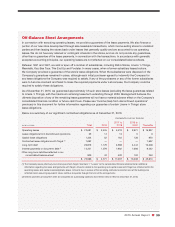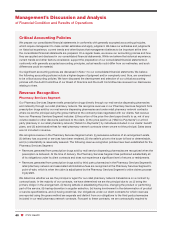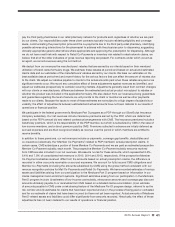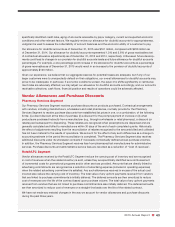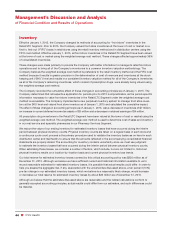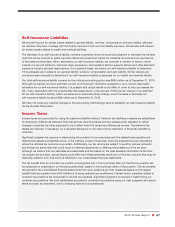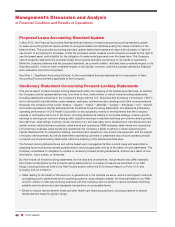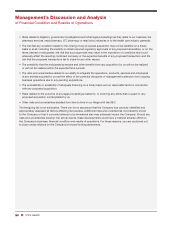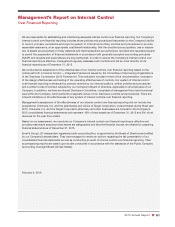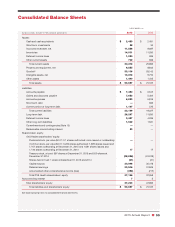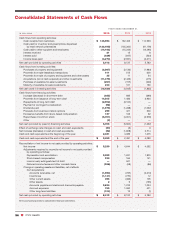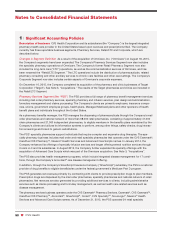CVS 2015 Annual Report Download - page 51
Download and view the complete annual report
Please find page 51 of the 2015 CVS annual report below. You can navigate through the pages in the report by either clicking on the pages listed below, or by using the keyword search tool below to find specific information within the annual report.
49
2015 Annual Report
• The possibility of PBM and LTC client loss and/or the failure to win new PBM and LTC business, including as
a result of failure to win renewal of expiring contracts, contract termination rights that may permit clients to
terminate a contract prior to expiration and early or periodic renegotiation of pricing by clients prior to expiration
of a contract.
• The possibility of loss of Medicare Part D business and/or failure to obtain new Medicare Part D business, whether
as a result of the annual Medicare Part D competitive bidding process or otherwise.
• Risks related to the frequency and rate of the introduction of generic drugs and brand name prescription products.
• Risks of declining gross margins in the PBM and LTC pharmacy industries attributable to increased competitive
pressures, increased client demand for lower prices, enhanced service offerings and/or higher service levels and
market dynamics and, with respect to the PBM industry, regulatory changes that impact our ability to offer plan
sponsors pricing that includes the use of retail “differential” or “spread.”
• Regulatory changes, business changes and compliance requirements and restrictions that may be imposed by
Centers for Medicare and Medicaid Services (“CMS”), Office of Inspector General or other government agencies
relating to the Company’s participation in Medicare, Medicaid and other federal and state government-funded
programs, including sanctions and remedial actions that may be imposed by CMS on its Medicare Part D business.
• Risks and uncertainties related to the timing and scope of reimbursement from Medicare, Medicaid and other
government-funded programs, including the possible impact of sequestration, the impact of other federal budget,
debt and deficit negotiations and legislation that could delay or reduce reimbursement from such programs and the
impact of any closure, suspension or other changes affecting federal or state government funding or operations.
• Possible changes in industry pricing benchmarks used to establish pricing in many of our PBM and LTC client
contracts, pharmaceutical purchasing arrangements, retail network contracts, specialty payor agreements and
other third party payor contracts.
• A highly competitive business environment, including the uncertain impact of increased consolidation in the PBM
industry, uncertainty concerning the ability of our retail pharmacy business to secure and maintain contractual
relationships with PBMs and other payors on acceptable terms, uncertainty concerning the ability of our PBM
business to secure and maintain competitive access, pricing and other contract terms from retail network pharma-
cies in an environment where some PBM clients are willing to consider adopting narrow or more restricted retail
pharmacy networks.
• The Company’s ability to timely identify or effectively respond to changing consumer preferences and spending
patterns, an inability to expand the products being purchased by our customers, or the failure or inability to obtain
or offer particular categories of products.
• Risks relating to our ability to secure timely and sufficient access to the products we sell from our domestic and/or
international suppliers.
• Reform of the U.S. health care system, including ongoing implementation of ACA, continuing legislative efforts,
regulatory changes and judicial interpretations impacting our health care system and the possibility of shifting
political and legislative priorities related to reform of the health care system in the future.
• Risks relating to any failure to properly maintain our information technology systems, our information security
systems and our infrastructure to support our business and to protect the privacy and security of sensitive
customer and business information.
• Risks related to compliance with a broad and complex regulatory framework, including compliance with new and
existing federal, state and local laws and regulations relating to health care, accounting standards, corporate
securities, tax, environmental and other laws and regulations affecting our business.


